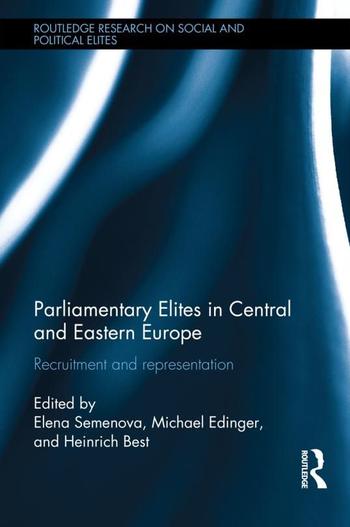Neuerscheinung Parliamentary Elites in Central and Eastern Europe
Legislators are entrusted with key parliamentary functions and are important figures in the decision-making process. Their behaviour as political elites is as much responsible for the failures and successes of the new democracies as their institutional designs and constitutional reforms.
This book provides a comparative examination of representative elites and their role in democratic development in post-communist Central and Eastern Europe (CEE). It argues that as the drivers of the transformation process in CEE, individual and collective parliamentary actors matter. The authors provide an in-depth analysis of representatives from eleven national parliaments and explore country-specific features of recruitment and representation. They draw on an integrated dataset of parliamentary elites for individual, party family, and parliamentary variables over the 20 years following the collapse of Communism and develop a common framework for the analysis of variations in democratisation and political professionalisation between parliaments and political parties/party families across CEE.
This unique volume will be of interest to students and scholars of comparative politics, elite research, post-communist politics, democratisation, legislative studies, and parliamentary representation.
News vom 11.12.2013
Parliamentary Elites in Central and Eastern Europe
Recruitment and Representation
Edited by Elena Semenova, Michael Edinger, Heinrich Best
December 2013
Hardback: 978-0-415-84346-1:$108 / £64
Author Biography- Elena Semenova was Postdoctoral Research Fellow at the Jena Graduate School "Human Behaviour in Social and Economic Change". She now serves as Assistant Professor at the Free University Berlin, Germany.
- Michael Edingeris Senior Lecturer in Political Science at the University of Jena, Germany.
- Heinrich Best is Professor and Chair of Empirical Research and Analysis of Social Structures at the Institute of Sociology, University of Jena, Germany.
- Parliamentary elite formation after communism: an introduction ELENA SEMENOVA, MICHAEL EDINGER, AND HEINRICH BEST
Part I: Central European Parliaments - The Czech parliament on the road to professionalization and stabilization ZDENKA MANSFELDOVÁ
- Hungarian MPs in the context of political transformation GABRIELLA ILONSZKI AND ANDRÁS SCHWARCZ
- The Polish Diet since 1989: from fragmentation to consolidation JACEK WASILEWSKI AND WITOLD BETKIEWICZ
Part II: Baltic - Parliaments Recruitment of parliamentary representatives in an ethno-liberal democracy: Estonia MINDAUGAS KUKLYS
- Legislative elites in multi-ethnic Latvia after 1990 MINDAUGAS KUKLYS
- Lithuanian parliamentary elites after 1990: dilemmas of political representation and political professionalism IRMINA MATONYTĖ AND GINTARAS ŠUMSKAS
- Croatian parliamentary elites: towards professionalization and homogenization VLASTA ILIŠIN and GORAN ČULAR
- The ‘waiting room’: Romanian parliament after 1989 LAURENŢIU ŞTEFAN AND RĂZVAN GRECU
Part III: Post-Soviet Parliaments - Legislative elite formation in Moldova: continuity and change WILLIAM CROWTHER
- Parliamentary representation and MPs in Russia: historical retrospective and comparative perspective OXANA GAMAN-GOLUTVINA
- Parliamentary representation in post-communist Ukraine: change and stability ELENA SEMENOVA
- Patterns of parliamentary elite recruitment in post-communist Europe: a comparative analysis ELENA SEMENOVA, MICHAEL EDINGER, AND HEINRICH BEST


